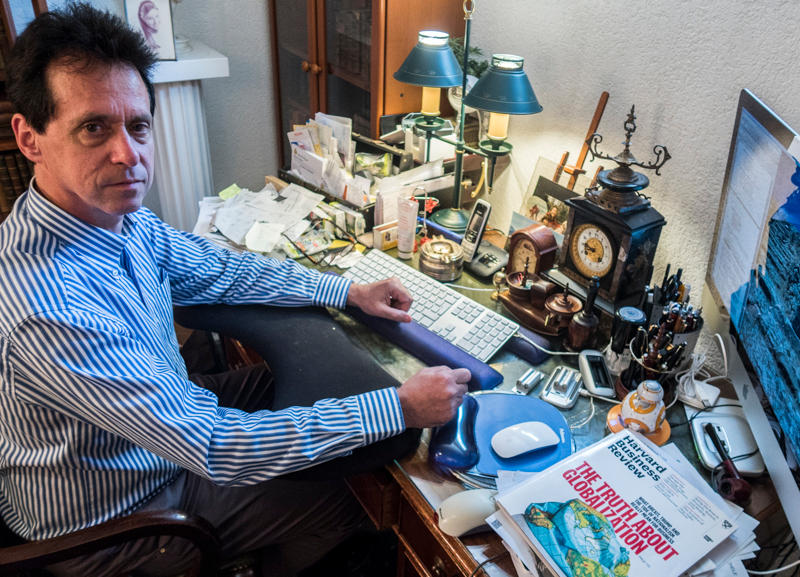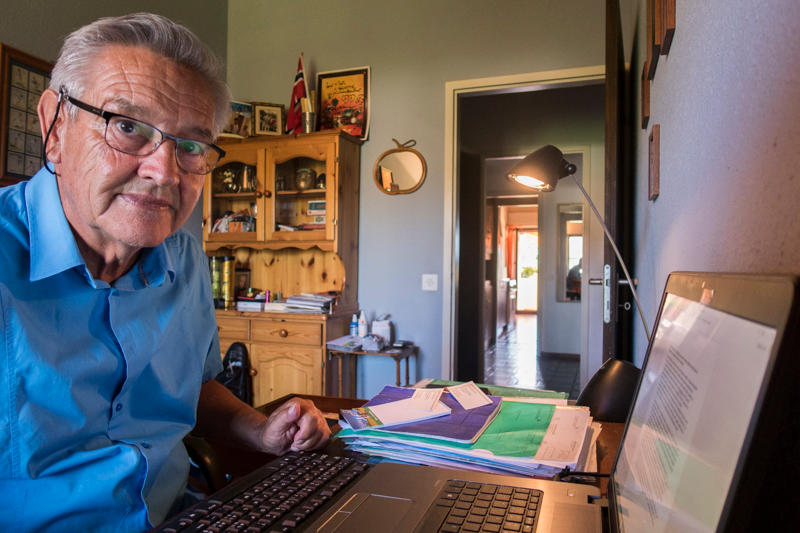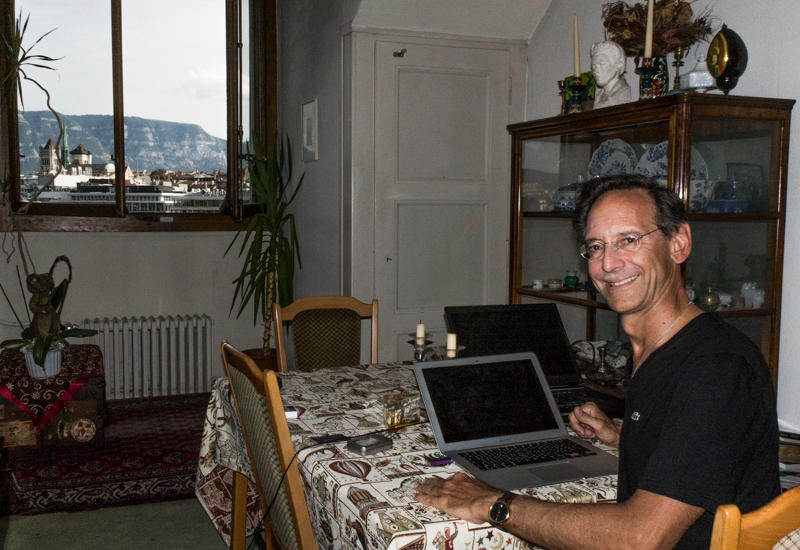Bridging linguistic barriers in Switzerland

In a small country with four official languages and an unofficial fifth, what is work like for Switzerland’s professional translators?
Does any country have a greater need for translators than Switzerland? Our little country of 8.3 million people has four official languages – German, French, Italian, Romansh – and a tolerated unofficial fifth: English. Immigrants comprise 25% of the population. We are home to the United Nations, NGOs, governmental bodies, businesses, and arts organisations that need to produce documents in various languages.
So yes, Switzerland is a country rich with opportunities for professional translators and interpreters (“translators” work on written materials, “interpreters” on spoken communication).
Who are these people, and what are the challenges and rewards of their profession in Switzerland? Meet four whose home base is Geneva.
The sworn translator

Patrick Lehner, French by birth, began studying English and German in school south of Paris. He didn’t especially love languages, but he did love English. “In German I was the worst,” he recalls, but later, as a young foreign exchange student in the UK, he was given a prize for high marks – the Rolling Stones’ hit single, “Brown Sugar”. He’s been an anglophile ever since.
Lehner came to Switzerland during his French military service under an exchange programme. He’s lived here since 1982.
Like many translators in Switzerland, Lehner is a freelancer, taking contracts with commercial businesses, law and accounting firms, banks, government, and through international translation agencies. He translates from German or English to French. Like almost all translators, he normally only translates into his mother tongue to best capture subtle nuances in the end product.
Lehner holds a certification as a “sworn translator”, which means his translations are officially accepted in most courts in Switzerland and Europe. He also does interpretation for the Geneva police.
He happily confesses that he prefers translating to interpreting partly because “you can work in shorts and not shave”.
“But I like the challenge of interpreting,” he says. “The stress is exciting.”
Lehner’s certification allows him to charge higher rates, but some possible clients decide that the service he provides is “too high a quality for too high a price”, he says from his home office in Geneva. This is increasingly so because of “the Googlisation of translation”, says Lehner, referring to online and downloadable translation applications. “We translators are a commodity”, he says. “We aren’t respected.”
The marketing man

Nigel Cave holds no official translator certification, but does hold three passports from Britain, Switzerland and New Zealand. Born in Britain to an English dad and a mum from New Zealand, he earned Bachelors and Masters degrees in Modern Languages at the University of Oxford. “I had an ear, and I had really good French and German teachers who inspired me,” he says.
Besides being fluent in French and German, Cave has a working knowledge of Spanish. He also understands Swiss-German thanks in part to a long-ago girlfriend who helped him with that dialect, which he describes as sounding like “a nice throat disease”.
Well along in his career of overlapping jobs in marketing, teaching and translation, he says he has no trouble finding translation work, and sometimes subcontracts with other translators when he’s too busy with contracts – or his “obsession” of tennis. “There might be a customer from time to time who asks if I’m certified,” he says, but most clients don’t care. “If you do a good job people come back to you.”
One of his favorite steady translation clients is Pro Helvetia, the Swiss Confederation’s arts council, for which he works from German and French into English. He also recalls one job for a memorable client who asked him to translate the script of a porno film.
But Cave has never translated poetry. He has been asked, but has always declined. Why? He suddenly switches to French: “Parce que ça ne marche pas facilement” (because it doesn’t easily work). Nevertheless, he offers his possibly blasphemous opinion that “Shakespeare is better in German”.
Also certainly blasphemous to some people, is that Cave is in favour of the spread of English in Swiss life. “I think it’s a very good thing. It’s opening up people’s minds, internationalising people’s minds.”
Still, he says he loves tradition and worries about the possible demise of Romansh, now spoken by less than 1% of the Swiss population. “But it’s democratic. If the people want it, it’s up to them.”
The radio man

Richard Cole has a different view on the encroachment of English. “It may be a useful compromise,” he says, but it’s a “cultural and political impoverishment for the country. People no longer have to bother to learn the other’s language and consequently don’t need to try and understand each other’s mentality and background.”
Cole was born in Chicago to a Swiss-German mother and American father. At first his mother spoke Swiss-German at home, but Dad said they should speak only English. Meanwhile, his Swiss grandmother read to him from a Swiss-German storybook.
In high school he had a choice between French and Spanish. The beauty of French called to him because “there’s something elliptical about it”.
At Northern Illinois University he majored in French Literature, then came to Geneva, where he earned a degree at L’École de Traduction d’Interpretation.
For 30 years, Cole has been employed as a translator at the European Broadcasting Union, where he is the website editor for the radio unit, translating scripts, brochures, artist bios and other materials into English from French, German, Italian and Spanish. He’s also a musicologist for the Orchestre de la Suisse Romande, and sings opera professionally.
Why is it important to translate from another language into the translator’s mother tongue and not the reverse? Because the translator can convey the original text in idioms that native speakers will recognise as authentic, and that reflect wide “knowledge of history, popular culture, literature and the arts in a certain language”, says Cole.
The interpreter

Diana Linder, originally from a village not far from Stuttgart, Germany, agrees that it’s best to work primarily into her mother tongue, though she adds that “my French is like my mother tongue now, same as German”. And she works primarily as an interpreter, so she’s usually doing that verbally.
Linder learned English at school in Germany, then as an exchange student in Britain and during a year in Denver, Colorado in the US, where she also studied Spanish and French.
She holds a Bachelors Degree in French and German from the University of East Anglia (Britain) with certification in Translation and Interpretation, and another certificate in Conference Interpreting from Geneva University.
One way she’s put her education to work was by doing movie subtitles, which she says was fun, but not very well paid.
Now she mostly interprets at international conferences – medical, governmental, commercial, etc.
Linder believes that certification matters because it indicates training and ability. She acknowledges that there are non-certified translators and interpreters in Switzerland who are experienced and qualified – and who charge lower rates. But she says that some unqualified translators or interpreters do not provide high-standard service. “Non-qualified colleagues are dangerous for our profession,” says Linder. “They tend to exercise downward pressure on the prices and may damage our reputation.”
Linder agrees with Richard Cole that the spread of English in Switzerland isn’t such a good thing. In multi-lingual meetings, she has observed that when everyone tries to speak English without interpreters, there’s sometimes confusion and misunderstanding. And of course, from her personal business perspective, all-English conferences without interpreters are “a very bad thing”.
How much do translators make?
Are opportunities for translators and interpreters shrinking in Switzerland? Not anytime soon.
They continue to find contracts within the country, and “fees in Switzerland are higher than anywhere else”, says Patrick Lehner, past president of the Association Suisse des Traducteures-Jurés (Swiss Association of Sworn Translators), which is one of several such professional associations in Switzerland. He says the typical selling price to European clients is about €1 (CHF1.15) per line or less, depending on the client’s country, while the typical selling price to Swiss clients is around CHF3.50.
But, as with any service, some potential clients balk at the cost, says Lehner.
“The main frustration comes from customers saying to me that I am too expensive, and that their secretary will do the job!”
Translating in Switzerland, and at swissinfo.ch
Translation and interpretation of documents and official communication is especially important in multilingual Switzerland, which has four national languages: German, French, Italian and Romansh. German, French, and Italian are full official languages of the Confederation – all laws and official documents have to be available in them – and Romansh is a “partial” official language for the purpose of communication with Romansh speakers.
Translation is also crucial at swissinfo.ch, which publishes in 10 languages and translates much of its content across its English, German, Italian, French, Spanish, Portuguese, Russian, Chinese, Arabic and Japanese pages.

In compliance with the JTI standards
More: SWI swissinfo.ch certified by the Journalism Trust Initiative











You can find an overview of ongoing debates with our journalists here . Please join us!
If you want to start a conversation about a topic raised in this article or want to report factual errors, email us at english@swissinfo.ch.